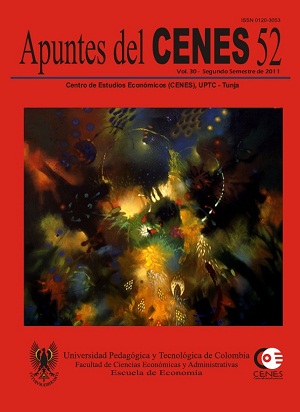Empirical evidence of the theory of consumption for colombia 2000-2010

Abstract
The paper evaluates the hypothesis of consumption of Keynes, Friedman, Modigliani and Hall, showing its theoretical elements along with the econometric verification of each one for Colombia, with quarterly data from the period 2000 to 2010. The differences that can be obtained in their analysis are shown with their consequent impacts on economic policy. The article concludes that the Keynesian hypothesis is useful for an analysis of economic policy in the short term, while Friedman’s hypothesis, with adaptive expectations, was more consistent in the long run than that of Modigliani and Hall.Keywords
Consumption theories, Keynesian function, life cycle, permanent income
Downloads
Download data is not yet available.